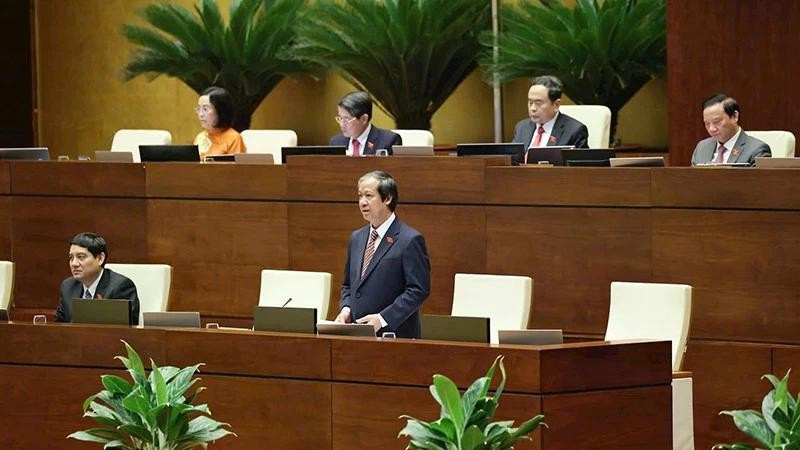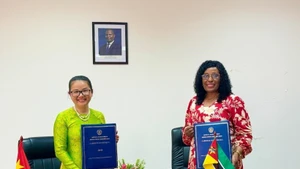The passage of the Law on Teachers is a source of joy for society at large and for more than 1.6 million teachers nationwide in particular. Le Thi Thanh Huyen, an English teacher at Chau Son Primary School (Ba Vi, Ha Noi), shared that her first reaction upon hearing the law had been passed was one of deep emotion and renewed faith.
The introduction of the Law on Teachers marks a milestone, reflecting the State’s and society’s recognition of the irreplaceable role of educators in the human development mission. The law stipulates that teachers’ salaries are to be ranked highest within the public sector pay scale. This is not only a matter of material remuneration but also a recognition of the profession’s social status.
With 451 out of 460 deputies present voting in favour (accounting for 94.35% of all deputies), the National Assembly passed the Law on Teachers. (Photo: DUY LINH)
Nguyen Thi Hong Thuy, Principal of Tan Tien Secondary School (Chuong My District, Ha Noi), noted: Clear legal provisions on the rights and obligations to protect teachers’ honour, dignity, and professional reputation, along with strict sanctions for violations, will contribute to building a safe and civilised educational environment, one in which teachers can feel secure and can thereby innovate and fully dedicate themselves.
From Yen Bai, Tran Thu Hang, Principal of Dai Dong Commune Kindergarten (Yen Binh District), could not hide her emotion. Kindergarten teachers have a highly demanding workload, both physically and mentally. Therefore, policies such as allowing early retirement up to five years before the standard age without salary reduction, and adjustments to salary grades and seniority allowances, are indeed long-awaited provisions.
Hang hopes that society will also change its perception—especially toward kindergarten teachers, who are still at times viewed merely as “babysitters.”
To ensure the Law on Teachers 2025 is implemented effectively, Le Thi Thanh Huyen believes that the Ministry of Education and Training must provide detailed and practical guidance tailored to local contexts. Implementation should go beyond formal reporting and be tied to independent monitoring and regular evaluations at educational institutions.
Teachers should also be involved in policy review processes, sharing real-world difficulties to ensure suitable adjustments. Only when those tasked with implementation are heard and supported can the law truly be truly sustainably effective.
According to Nguyen Thi Hong Thuy, effective coordination across multiple sectors is essential. Education management agencies must soon issue detailed guiding documents to concretise the law’s provisions. Schools should take the initiative to improve working environments, creating conditions for teachers to develop professionally, express their capabilities, and commit long-term.
Each teacher must also continuously strive to improve their professional skills and uphold professional ethics, becoming a trusted foundation for students and worthy of society’s respect and trust.
According to Vu Minh Duc, Director of the Department of Teachers and Educational Administrators (Ministry of Education and Training), the Law on Teachers for the first time establishes a comprehensive legal status for teachers at both public and non-public educational institutions. Non-public teachers are officially recognised as practising a special profession, with equivalent professional standards, rights, and obligations.
The law clearly stipulates their right to the protection of their honour and dignity, and provides strict penalties for acts of abuse toward teachers. One significant provision prohibits individuals and organisations from disseminating accusatory information about teachers before there is an official conclusion from the competent authorities. This protects teachers from social pressure and helps preserve a safe and respectful educational environment.
According to Vu Minh Duc, another notable feature is the provision that teachers’ salaries will be ranked highest within the administrative and public sector pay scale. The Ministry of Education and Training is currently drafting a decree on salary policies, allowances, and support mechanisms to attract and retain teachers.
It is expected that salary scales for certain positions—such as kindergarten, general education, pre-university, and vocational education teachers—will be revised to ensure parity with other professions.
The Ministry of Education and Training is also urgently drafting two decrees and nearly twenty guiding circulars to be issued in a timely manner, aiming to fully solidify the contents of the law and ensure coherence, consistency, and feasibility.
















